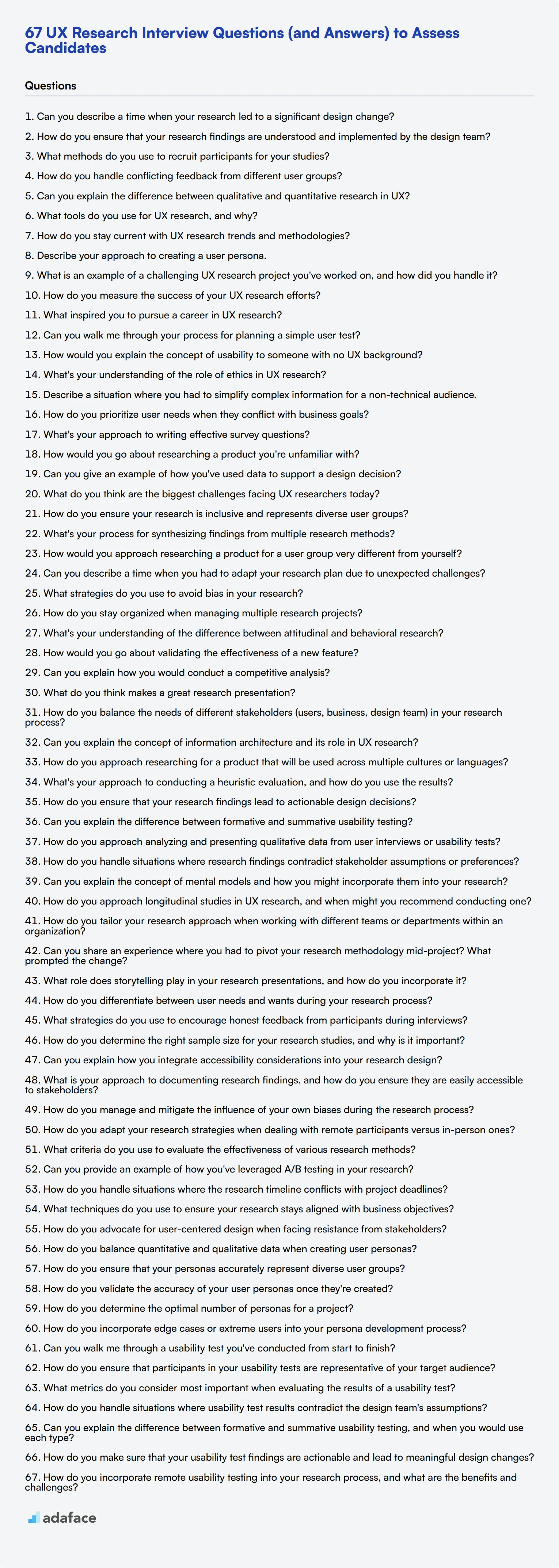Hiring the right UX Researcher can make or break your product development process. A skilled UX Researcher can uncover invaluable insights about your users, inform design decisions, and ultimately contribute to creating products that truly resonate with your target audience.
This blog post provides a comprehensive list of UX Research interview questions tailored for different experience levels, from junior to senior researchers. We've also included specific questions related to user personas and usability testing to help you assess candidates' expertise in these crucial areas.
By using these questions, you'll be better equipped to identify top UX Research talent for your team. Consider assessing candidates with a UX skills test before the interview to streamline your hiring process and ensure you're interviewing the most qualified applicants.
Table of contents
10 basic UX Research interview questions and answers to assess candidates
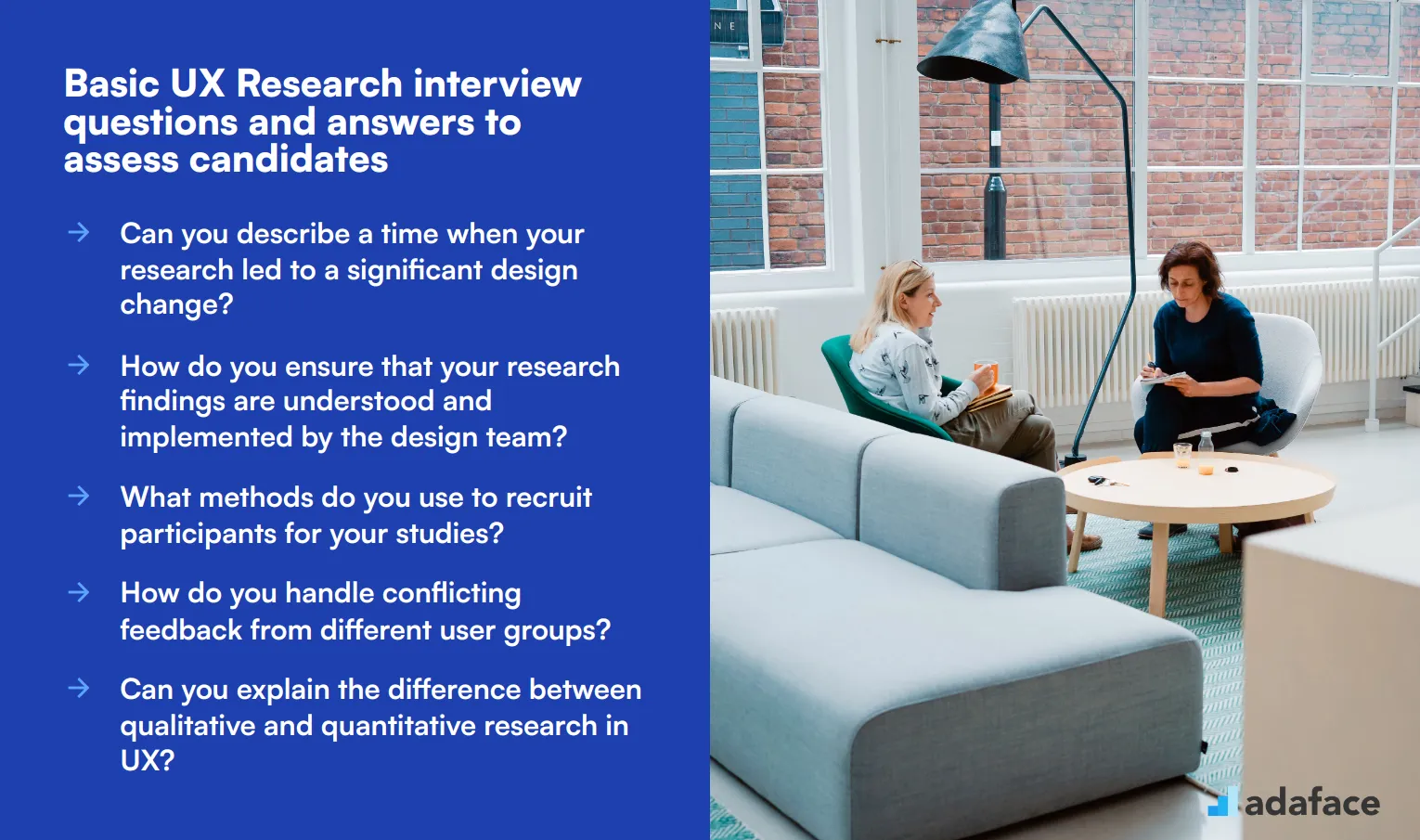
To effectively gauge a candidate's fit for a UX Research role, use these 10 interview questions. They are designed to help you assess their understanding of basic UX concepts and methodologies, ensuring you find the right talent for your team.
1. Can you describe a time when your research led to a significant design change?
A strong candidate will describe a specific instance where their research had a tangible impact on a project. They should detail the context, the research methods used, and the insights gained.
Look for candidates who can clearly articulate the before and after scenarios, showing how their findings influenced design decisions. Follow up with questions about the challenges they faced and how they overcame them.
2. How do you ensure that your research findings are understood and implemented by the design team?
Candidates should explain their approach to communicating research insights effectively. This might include using storytelling techniques, creating visual aids like personas or journey maps, and conducting workshops.
Ideal answers will demonstrate the candidate's ability to bridge the gap between research and design, ensuring collaboration and alignment across teams.
3. What methods do you use to recruit participants for your studies?
Expect candidates to mention a variety of recruitment methods, such as leveraging social media, using participant databases, or partnering with external agencies.
A well-rounded answer will highlight their understanding of recruiting diverse participants to ensure comprehensive and unbiased research outcomes.
4. How do you handle conflicting feedback from different user groups?
Candidates should discuss their process for prioritizing feedback, such as identifying common themes or focusing on the needs of the primary user group.
An ideal response will show their ability to balance conflicting opinions while maintaining a user-centered approach to design decisions.
5. Can you explain the difference between qualitative and quantitative research in UX?
Qualitative research focuses on understanding user behaviors, motivations, and attitudes through methods like interviews, focus groups, and usability testing. It provides deep, contextual insights.
Quantitative research, on the other hand, involves measuring user behaviors and preferences using methods like surveys, analytics, and A/B testing. It provides data that can be statistically analyzed.
Look for candidates who can articulate the strengths and limitations of each approach and know when to use them effectively.
6. What tools do you use for UX research, and why?
Candidates should mention specific tools they have experience with, such as usability testing platforms (e.g., UserTesting), survey tools (e.g., SurveyMonkey), and analytics software (e.g., Google Analytics).
A strong answer will demonstrate their ability to select the appropriate tools based on the research objectives, emphasizing their technical proficiency and adaptability.
7. How do you stay current with UX research trends and methodologies?
Candidates may mention various ways they stay updated, such as attending conferences, participating in online courses, reading industry blogs, and engaging with professional communities.
Look for answers that show a commitment to continuous learning and an active interest in the evolving field of UX research.
8. Describe your approach to creating a user persona.
A thorough answer will detail a step-by-step approach, including gathering data from user research, identifying patterns and trends, and creating a detailed persona profile that includes demographics, behaviors, goals, and pain points.
Candidates should also explain how they use personas to inform design decisions and ensure a user-centered approach throughout the project.
9. What is an example of a challenging UX research project you've worked on, and how did you handle it?
Look for candidates to describe a specific project, outlining the challenges faced, their research approach, and the steps taken to overcome obstacles.
Ideal responses will highlight their problem-solving skills, adaptability, and ability to deliver actionable insights despite difficulties.
10. How do you measure the success of your UX research efforts?
Candidates should discuss various metrics and KPIs they use to evaluate the impact of their research, such as user satisfaction scores, task completion rates, and usability test findings.
A strong answer will also include examples of how they have used these metrics to demonstrate the value of their research to stakeholders and drive continuous improvement.
20 UX Research interview questions to ask junior researchers
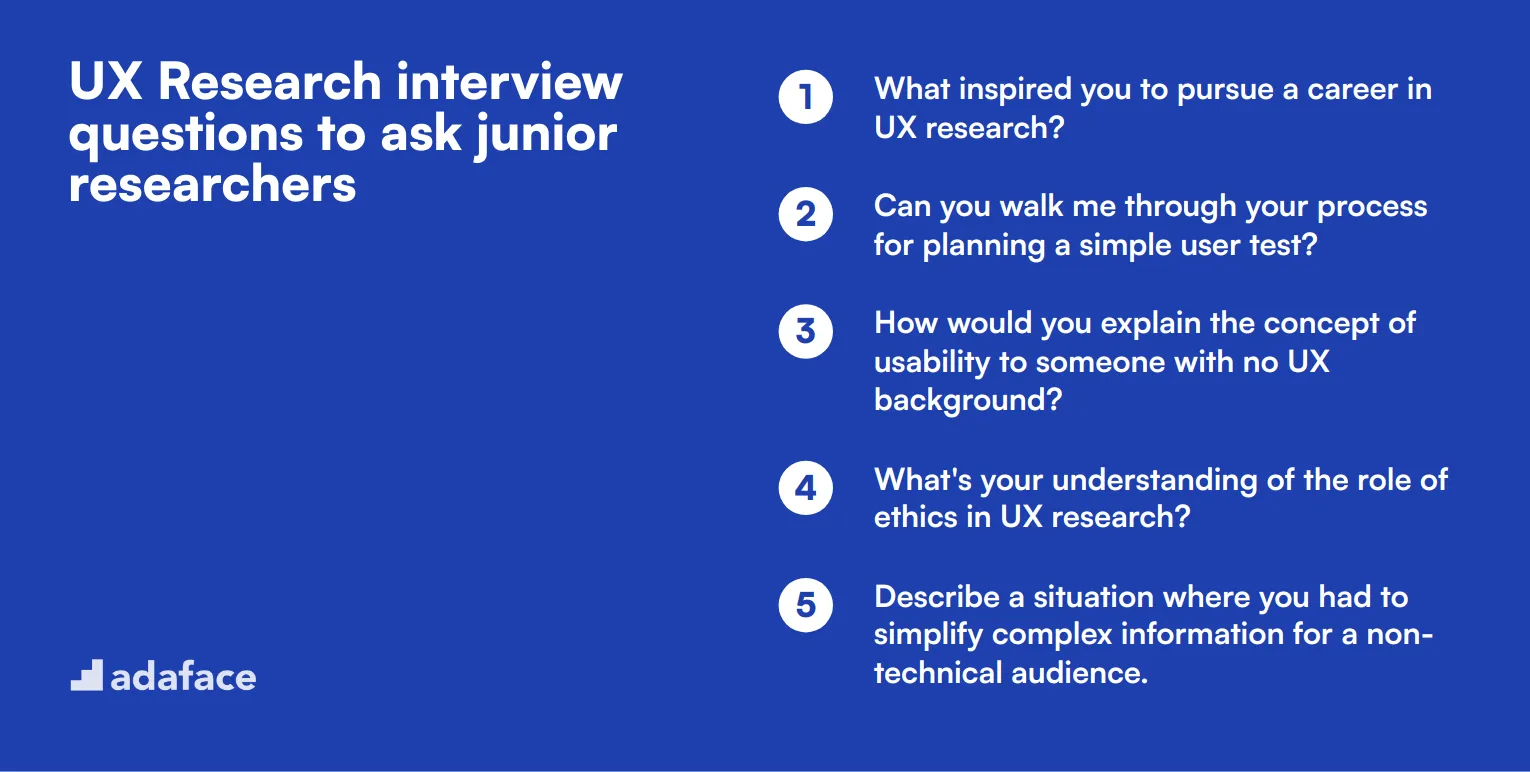
When interviewing junior researchers, it's crucial to assess their foundational skills and potential. Use these questions to gauge their understanding of UX research basics, problem-solving abilities, and enthusiasm for the field. They'll help you identify candidates who can grow into valuable team members.
- What inspired you to pursue a career in UX research?
- Can you walk me through your process for planning a simple user test?
- How would you explain the concept of usability to someone with no UX background?
- What's your understanding of the role of ethics in UX research?
- Describe a situation where you had to simplify complex information for a non-technical audience.
- How do you prioritize user needs when they conflict with business goals?
- What's your approach to writing effective survey questions?
- How would you go about researching a product you're unfamiliar with?
- Can you give an example of how you've used data to support a design decision?
- What do you think are the biggest challenges facing UX researchers today?
- How do you ensure your research is inclusive and represents diverse user groups?
- What's your process for synthesizing findings from multiple research methods?
- How would you approach researching a product for a user group very different from yourself?
- Can you describe a time when you had to adapt your research plan due to unexpected challenges?
- What strategies do you use to avoid bias in your research?
- How do you stay organized when managing multiple research projects?
- What's your understanding of the difference between attitudinal and behavioral research?
- How would you go about validating the effectiveness of a new feature?
- Can you explain how you would conduct a competitive analysis?
- What do you think makes a great research presentation?
10 intermediate UX Research interview questions and answers to ask mid-tier researchers
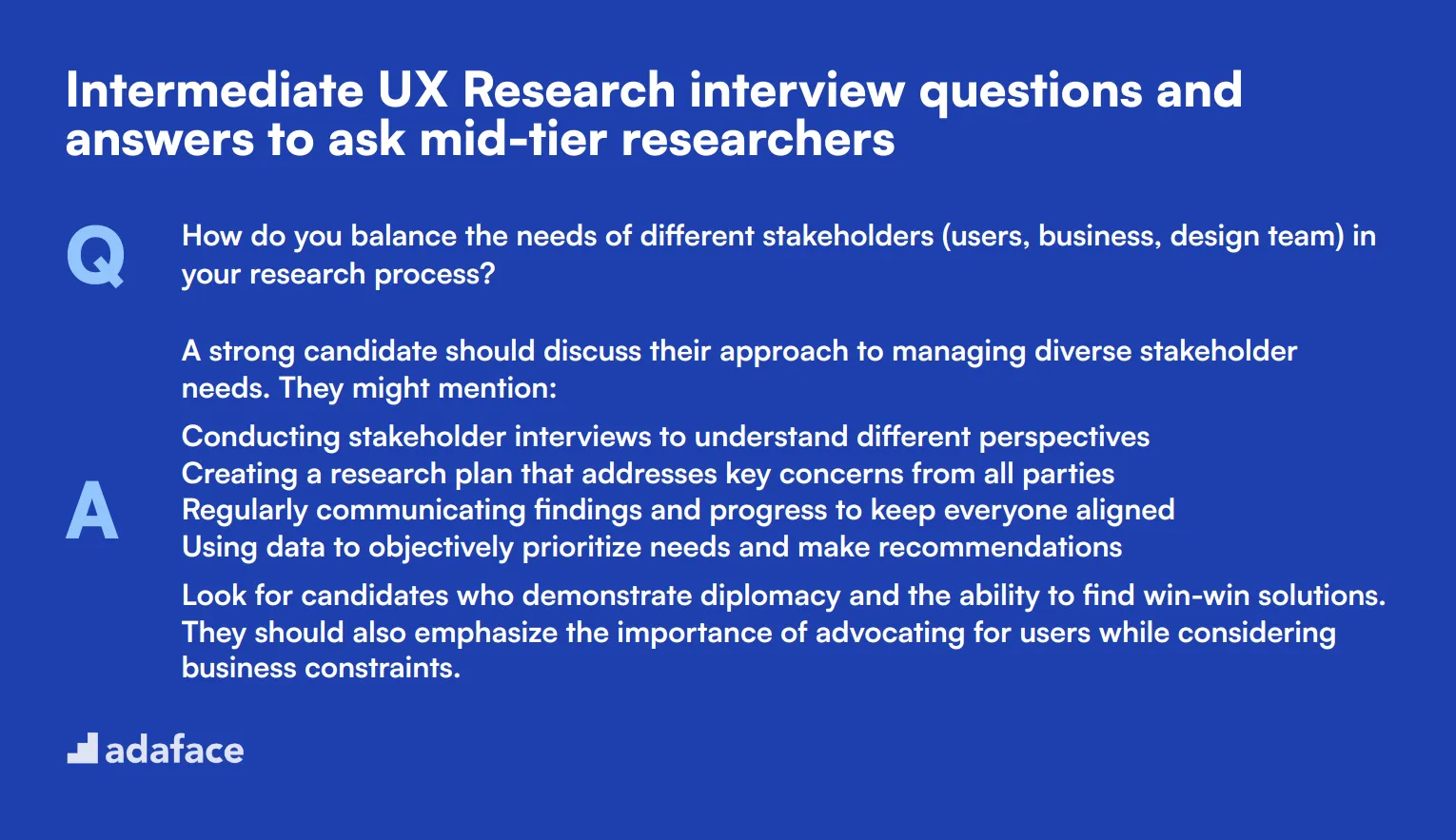
Ready to dive deeper into the world of UX research? These intermediate questions will help you assess mid-tier researchers' skills and experience. Use this list to gauge candidates' ability to handle more complex projects and their understanding of nuanced UX concepts. Remember, the best UX researchers blend analytical thinking with empathy, so look for both in their responses.
1. How do you balance the needs of different stakeholders (users, business, design team) in your research process?
A strong candidate should discuss their approach to managing diverse stakeholder needs. They might mention:
- Conducting stakeholder interviews to understand different perspectives
- Creating a research plan that addresses key concerns from all parties
- Regularly communicating findings and progress to keep everyone aligned
- Using data to objectively prioritize needs and make recommendations
Look for candidates who demonstrate diplomacy and the ability to find win-win solutions. They should also emphasize the importance of advocating for users while considering business constraints.
2. Can you explain the concept of information architecture and its role in UX research?
A competent candidate should be able to explain that information architecture (IA) is the practice of organizing, structuring, and labeling content in an effective and sustainable way. They might elaborate on its importance in UX research:
- IA helps create intuitive navigation systems and content hierarchies
- It influences how users find and understand information
- UX researchers use IA principles to inform site maps, user flows, and content strategy
Look for candidates who can connect IA to user behavior and research methodologies. They should mention techniques like card sorting or tree testing as ways to validate and improve information architecture.
3. How do you approach researching for a product that will be used across multiple cultures or languages?
An experienced researcher should outline a comprehensive approach to cross-cultural research. They might discuss:
- Conducting background research on target cultures and their digital behaviors
- Partnering with local researchers or translators to ensure cultural relevance
- Adapting research methods to suit different cultural contexts
- Using a mix of quantitative and qualitative methods to capture nuanced cultural differences
Pay attention to candidates who emphasize the importance of avoiding cultural bias and stereotypes. They should also mention the need for localization in research materials and the potential use of comparative analysis across different markets.
4. What's your approach to conducting a heuristic evaluation, and how do you use the results?
A skilled UX researcher should be able to explain that a heuristic evaluation is an expert review of a user interface based on established usability principles. They might describe their process as:
- Selecting appropriate heuristics (e.g., Nielsen's 10 Usability Heuristics)
- Systematically reviewing the interface against each heuristic
- Documenting and prioritizing usability issues
- Collaborating with designers to brainstorm solutions
Look for candidates who mention using heuristic evaluations as a complement to user testing, not a replacement. They should also discuss how they translate findings into actionable recommendations for the design team.
5. How do you ensure that your research findings lead to actionable design decisions?
An effective UX researcher should have strategies for translating research into design impact. They might mention:
- Creating clear, concise research reports with key findings highlighted
- Developing user personas or journey maps to make insights more tangible
- Facilitating workshops with designers to ideate based on research findings
- Collaborating closely with product managers to prioritize user needs
Pay attention to candidates who emphasize the importance of ongoing communication with the design team. They should also mention techniques for measuring the impact of design changes based on research recommendations.
6. Can you explain the difference between formative and summative usability testing?
A knowledgeable candidate should be able to clearly differentiate between these two types of usability testing:
- Formative testing: Conducted early in the design process to identify usability issues and inform design decisions. It's often more qualitative and exploratory.
- Summative testing: Performed on more complete designs or products to evaluate overall usability, often using quantitative metrics like task completion rates or time on task.
Look for candidates who can explain when to use each type of testing and how they complement each other in the UX research process. They should also mention how the results of each type of testing are typically used in product development.
7. How do you approach analyzing and presenting qualitative data from user interviews or usability tests?
A skilled researcher should outline a systematic approach to qualitative data analysis. They might describe steps like:
- Transcribing and organizing raw data
- Coding responses to identify themes and patterns
- Using affinity diagrams or other visualization techniques to group insights
- Triangulating findings with quantitative data when available
For presentation, look for candidates who emphasize storytelling and the use of direct user quotes or video clips to bring insights to life. They should also mention strategies for making recommendations based on the analyzed data.
8. How do you handle situations where research findings contradict stakeholder assumptions or preferences?
An experienced UX researcher should have strategies for navigating potentially sensitive situations. They might discuss:
- Presenting findings objectively, backed by solid data and methodology
- Framing contradictions as opportunities for innovation rather than criticisms
- Using storytelling techniques to help stakeholders empathize with user perspectives
- Proposing A/B tests or pilot studies to validate findings further if needed
Look for candidates who demonstrate diplomacy and strong communication skills. They should emphasize the importance of maintaining scientific integrity while being sensitive to organizational dynamics.
9. Can you explain the concept of mental models and how you might incorporate them into your research?
A knowledgeable candidate should explain that mental models are internal representations of how users believe a system works. They might discuss incorporating mental models into research by:
- Conducting interviews or card sorting exercises to uncover users' existing mental models
- Creating user journey maps or cognitive walkthroughs based on these models
- Comparing users' mental models with the actual system design to identify potential usability issues
- Using findings to inform information architecture and interface design
Look for candidates who understand the importance of aligning product design with users' mental models to create intuitive experiences. They should also mention how mental models can vary across different user groups or cultures.
10. How do you approach longitudinal studies in UX research, and when might you recommend conducting one?
An experienced researcher should be able to explain that longitudinal studies involve collecting data from the same participants over an extended period. They might discuss approaches like:
- Setting clear research objectives and metrics to track over time
- Designing a study plan with multiple touchpoints (e.g., surveys, interviews, usage data)
- Using tools to manage participant retention and data collection
- Analyzing trends and changes in user behavior or attitudes over time
Look for candidates who can identify appropriate scenarios for longitudinal studies, such as evaluating the long-term impact of a new feature or understanding how user needs evolve. They should also mention challenges like participant attrition and strategies to mitigate them.
15 advanced UX Research interview questions to ask senior researchers
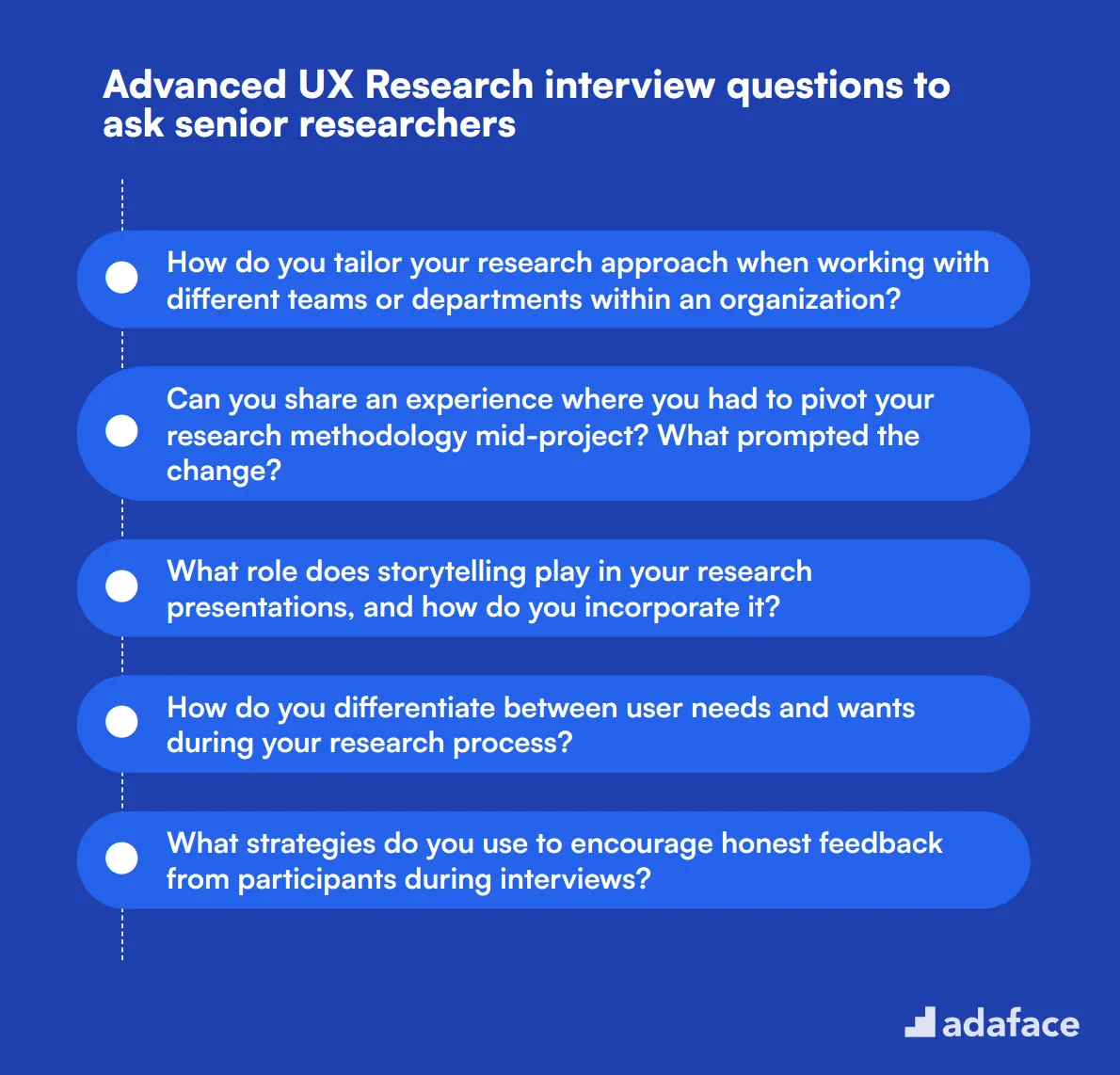
To identify whether senior UX researchers possess the advanced skills necessary for high-level projects, refer to this list of insightful questions. These queries can guide your interviews and help you discover how candidates approach real-world challenges in UX research. For further insights, check out our UX researcher job description.
- How do you tailor your research approach when working with different teams or departments within an organization?
- Can you share an experience where you had to pivot your research methodology mid-project? What prompted the change?
- What role does storytelling play in your research presentations, and how do you incorporate it?
- How do you differentiate between user needs and wants during your research process?
- What strategies do you use to encourage honest feedback from participants during interviews?
- How do you determine the right sample size for your research studies, and why is it important?
- Can you explain how you integrate accessibility considerations into your research design?
- What is your approach to documenting research findings, and how do you ensure they are easily accessible to stakeholders?
- How do you manage and mitigate the influence of your own biases during the research process?
- How do you adapt your research strategies when dealing with remote participants versus in-person ones?
- What criteria do you use to evaluate the effectiveness of various research methods?
- Can you provide an example of how you've leveraged A/B testing in your research?
- How do you handle situations where the research timeline conflicts with project deadlines?
- What techniques do you use to ensure your research stays aligned with business objectives?
- How do you advocate for user-centered design when facing resistance from stakeholders?
5 UX Research interview questions and answers related to user personas
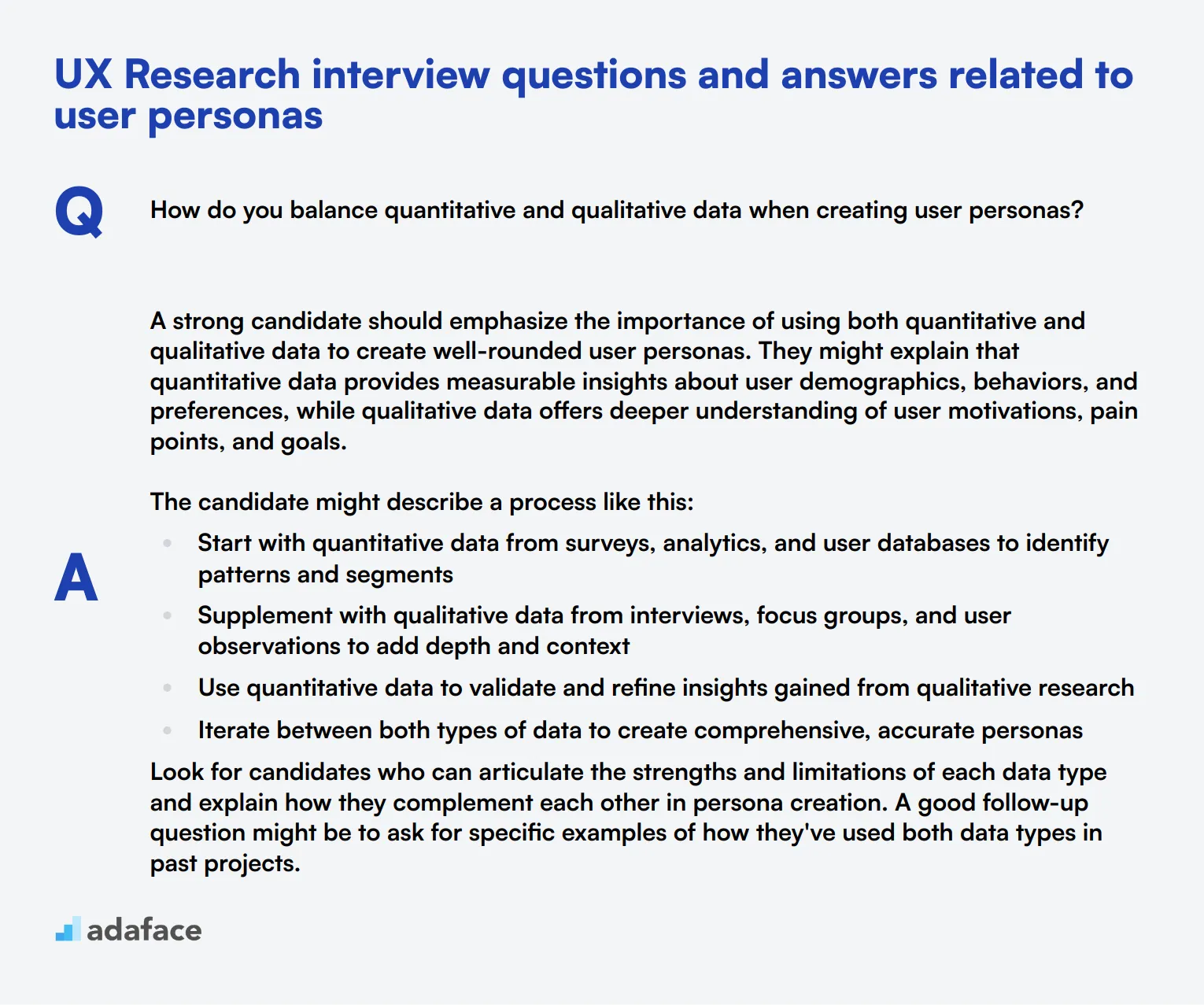
When it comes to user personas, asking the right questions can reveal a candidate's depth of understanding and approach to creating these vital UX tools. Use these questions to gauge how well a potential UX researcher can craft accurate, useful personas that will guide product development and enhance user experiences.
1. How do you balance quantitative and qualitative data when creating user personas?
A strong candidate should emphasize the importance of using both quantitative and qualitative data to create well-rounded user personas. They might explain that quantitative data provides measurable insights about user demographics, behaviors, and preferences, while qualitative data offers deeper understanding of user motivations, pain points, and goals.
The candidate might describe a process like this:
- Start with quantitative data from surveys, analytics, and user databases to identify patterns and segments
- Supplement with qualitative data from interviews, focus groups, and user observations to add depth and context
- Use quantitative data to validate and refine insights gained from qualitative research
- Iterate between both types of data to create comprehensive, accurate personas
Look for candidates who can articulate the strengths and limitations of each data type and explain how they complement each other in persona creation. A good follow-up question might be to ask for specific examples of how they've used both data types in past projects.
2. How do you ensure that your personas accurately represent diverse user groups?
An ideal candidate should demonstrate awareness of the importance of diversity and inclusion in user persona creation. They might discuss strategies such as:
- Intentionally seeking out and including participants from diverse backgrounds in research
- Using inclusive language and avoiding stereotypes in persona descriptions
- Regularly reviewing and updating personas to ensure they remain representative
- Collaborating with diversity and inclusion experts or employee resource groups
Look for candidates who show a nuanced understanding of diversity beyond just demographic factors. They should be able to discuss how different aspects of identity (e.g., age, gender, ethnicity, ability, socioeconomic status) can intersect and influence user needs and behaviors. A strong answer might also touch on the potential consequences of not representing diverse user groups in personas, such as perpetuating biases or missing key insights.
3. How do you validate the accuracy of your user personas once they're created?
A competent UX researcher should have a systematic approach to validating user personas. They might describe a process that includes:
- Presenting personas to stakeholders and team members for feedback and alignment
- Conducting additional user interviews or surveys to verify persona characteristics
- Using A/B testing or usability studies to see if design decisions based on personas lead to improved outcomes
- Regularly reviewing analytics data to ensure persona behaviors align with actual user behaviors
Look for candidates who emphasize that persona validation is an ongoing process, not a one-time event. They should be able to explain how they incorporate new data and insights to refine personas over time. A good follow-up question might be to ask about a time when they discovered a persona was inaccurate and how they addressed it.
4. How do you determine the optimal number of personas for a project?
A skilled candidate should explain that the number of personas depends on the project's scope, complexity, and the diversity of the user base. They might mention that typically, 3-5 personas are sufficient for most projects, but this can vary.
The candidate might describe their approach as follows:
- Analyze research data to identify distinct user groups with unique needs and behaviors
- Consider the project goals and resources available for design and development
- Balance the need for comprehensive representation with the risk of overwhelming the team with too many personas
- Prioritize personas based on their importance to the project's success
Look for candidates who understand that quality is more important than quantity when it comes to personas. They should be able to explain how they would make trade-offs between having fewer, more detailed personas versus a larger number of less developed ones. A good follow-up question might be to ask how they would handle a situation where stakeholders are pushing for more personas than the researcher thinks are necessary.
5. How do you incorporate edge cases or extreme users into your persona development process?
A thoughtful candidate should recognize the value of considering edge cases and extreme users in the persona development process. They might explain that while personas typically represent core user groups, edge cases can provide valuable insights that lead to more inclusive and robust designs.
The candidate might describe an approach like this:
- Identify potential edge cases through data analysis and stakeholder input
- Conduct focused research on extreme users to understand their unique needs and behaviors
- Create separate 'edge case personas' or incorporate extreme user characteristics into existing personas as variations
- Use edge case insights to inform design decisions and uncover potential issues that might affect a broader user base
Look for candidates who can balance the need to address edge cases with the primary goal of serving core users. They should be able to explain how considering extreme users can lead to innovations that benefit all users. A good follow-up question might be to ask for an example of when considering an edge case led to a significant improvement in a product's design.
7 UX Research interview questions and answers related to usability testing
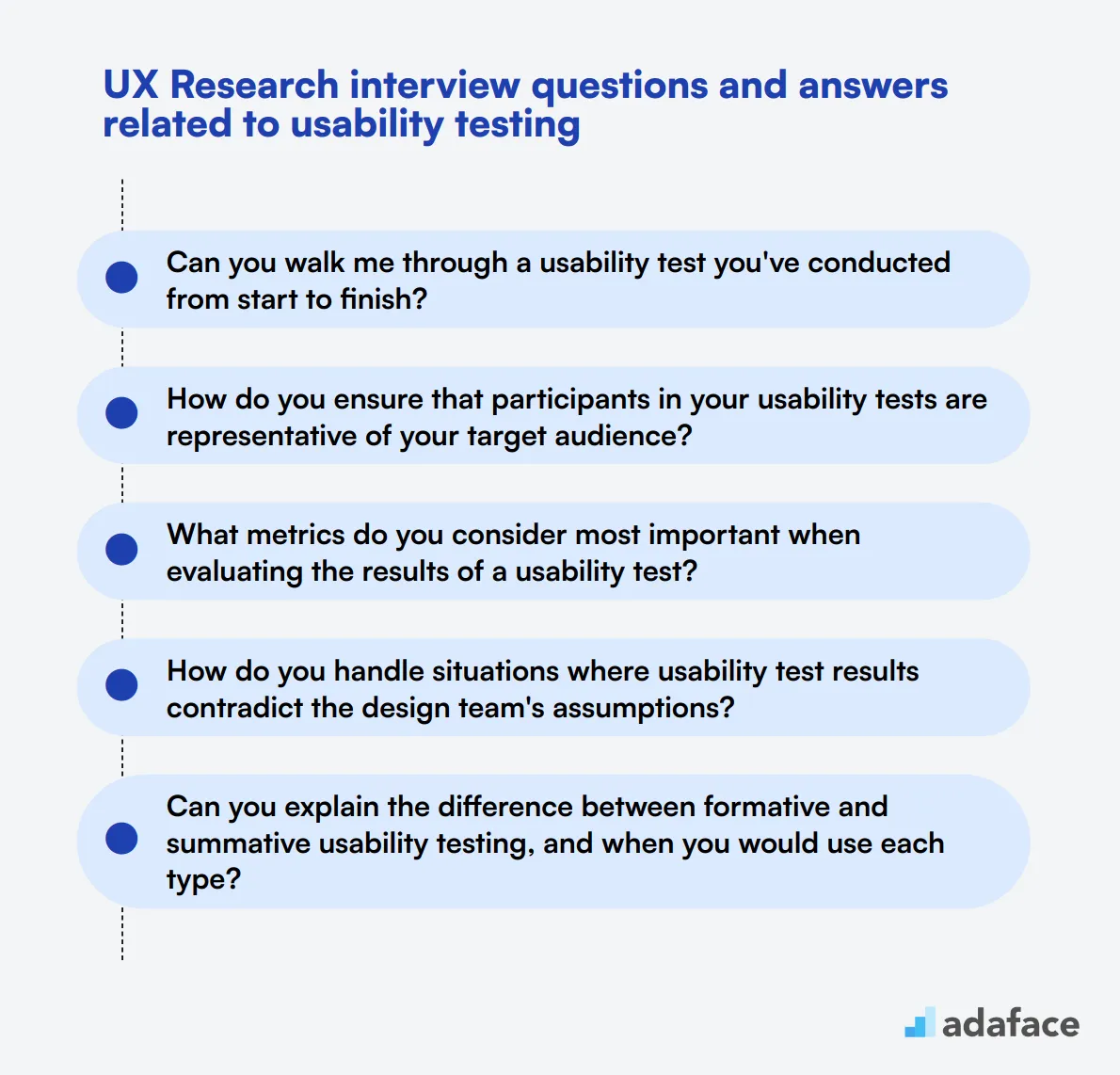
When it comes to hiring the best UX researchers, knowing the right questions to ask about usability testing can be a game-changer. These questions will help you uncover how candidates think, analyze, and solve usability issues, ensuring you find the perfect fit for your team.
1. Can you walk me through a usability test you've conducted from start to finish?
In this answer, look for candidates to detail each step of their usability testing process. They should start by explaining how they define the objectives and goals of the test. Next, they should discuss how they recruit participants, design the test scenarios, and conduct the test sessions.
Candidates should also talk about how they gather and analyze the data, and finally, how they present their findings and recommendations to the team. It's essential to ensure they emphasize the importance of clear goals, thorough planning, and actionable insights.
Strong responses will demonstrate a systematic approach and the ability to communicate their findings effectively. Look for examples that show their experience with different types of usability tests and their ability to adapt their process to the context of the project.
2. How do you ensure that participants in your usability tests are representative of your target audience?
Candidates should explain their approach to participant recruitment, focusing on the importance of selecting individuals who match the user personas for the product or service. They might mention using screening surveys to filter candidates or working with recruiting agencies to find specific user demographics.
Additionally, they should discuss any methods they use to confirm that the participants genuinely represent the target audience, such as validating their background and behaviors. This ensures that the insights gathered are relevant and actionable.
An ideal candidate will emphasize the importance of diversity and inclusivity in their participant selection process. They should be able to provide examples of how they have successfully recruited a representative sample in the past.
3. What metrics do you consider most important when evaluating the results of a usability test?
For this question, candidates should discuss several key metrics they use to evaluate usability. These might include task success rate, time on task, error rate, and user satisfaction. They should explain why these metrics are important and how they use them to identify usability issues.
They might also mention qualitative data, such as user comments and observations, which can provide deeper insights into user behavior and pain points. Combining both quantitative and qualitative data allows for a more comprehensive understanding of the user experience.
Look for candidates who can explain how they balance these metrics to form a complete picture of usability. Ideal responses will show an understanding of which metrics are most relevant to different types of projects and how to prioritize them accordingly.
4. How do you handle situations where usability test results contradict the design team's assumptions?
Candidates should articulate a clear strategy for addressing contradictions between usability test results and the design team's assumptions. They might start by discussing the importance of presenting data in a clear, objective manner, using both qualitative and quantitative evidence.
They should also mention the value of fostering open communication and collaboration within the team, encouraging designers to see user feedback as an opportunity for improvement. It's helpful if they can provide examples of past experiences where they successfully navigated such conflicts.
Ideal candidates will emphasize their ability to remain diplomatic and focused on the goal of enhancing user experience. Look for indications that they can effectively advocate for user-centered design while respecting the expertise and perspectives of the design team.
5. Can you explain the difference between formative and summative usability testing, and when you would use each type?
Formative usability testing is conducted during the design process to identify issues and inform design improvements. Summative usability testing, on the other hand, is performed after a design is complete to evaluate its overall effectiveness and usability.
Candidates should explain that formative testing is used for early-stage feedback and iterative design, while summative testing is used to validate the final design and ensure it meets usability standards. They might also provide examples of projects where they have used each type of testing.
Look for candidates who demonstrate a clear understanding of the different purposes and timing of these tests. Ideal answers will show that they can select the appropriate type of testing based on the project's stage and objectives.
6. How do you make sure that your usability test findings are actionable and lead to meaningful design changes?
To ensure usability test findings are actionable, candidates should talk about the importance of clear, concise reporting that highlights key issues and provides specific recommendations for improvement. They might mention using visual aids like charts or heatmaps to illustrate findings.
They should also discuss the importance of collaborating with the design team to prioritize issues and create a plan for addressing them. This might involve follow-up meetings or workshops to ensure everyone is on the same page.
Strong candidates will emphasize their ability to communicate findings in a way that is understandable and compelling to designers and other stakeholders. Look for examples of how their recommendations have led to significant design changes in past projects.
7. How do you incorporate remote usability testing into your research process, and what are the benefits and challenges?
Candidates should discuss the tools and platforms they use for remote usability testing, such as video conferencing software and screen-sharing applications. They should explain how they adapt their test plans and scenarios to work effectively in a remote context.
They might mention benefits like the ability to recruit participants from a wider geographic area and the convenience for both researchers and participants. However, they should also discuss challenges such as technical issues, lack of control over the testing environment, and potential difficulties in observing non-verbal cues.
An ideal candidate will demonstrate flexibility and problem-solving skills in adapting their research methods to remote testing. Look for examples where they successfully conducted remote usability tests and how they addressed any challenges that arose.
Which UX Research skills should you evaluate during the interview phase?
While a single interview cannot encompass every facet of a candidate's capabilities, identifying core UX Research skills is key for making a well-informed hiring decision. Here are some critical skills to focus on during the interview phase.
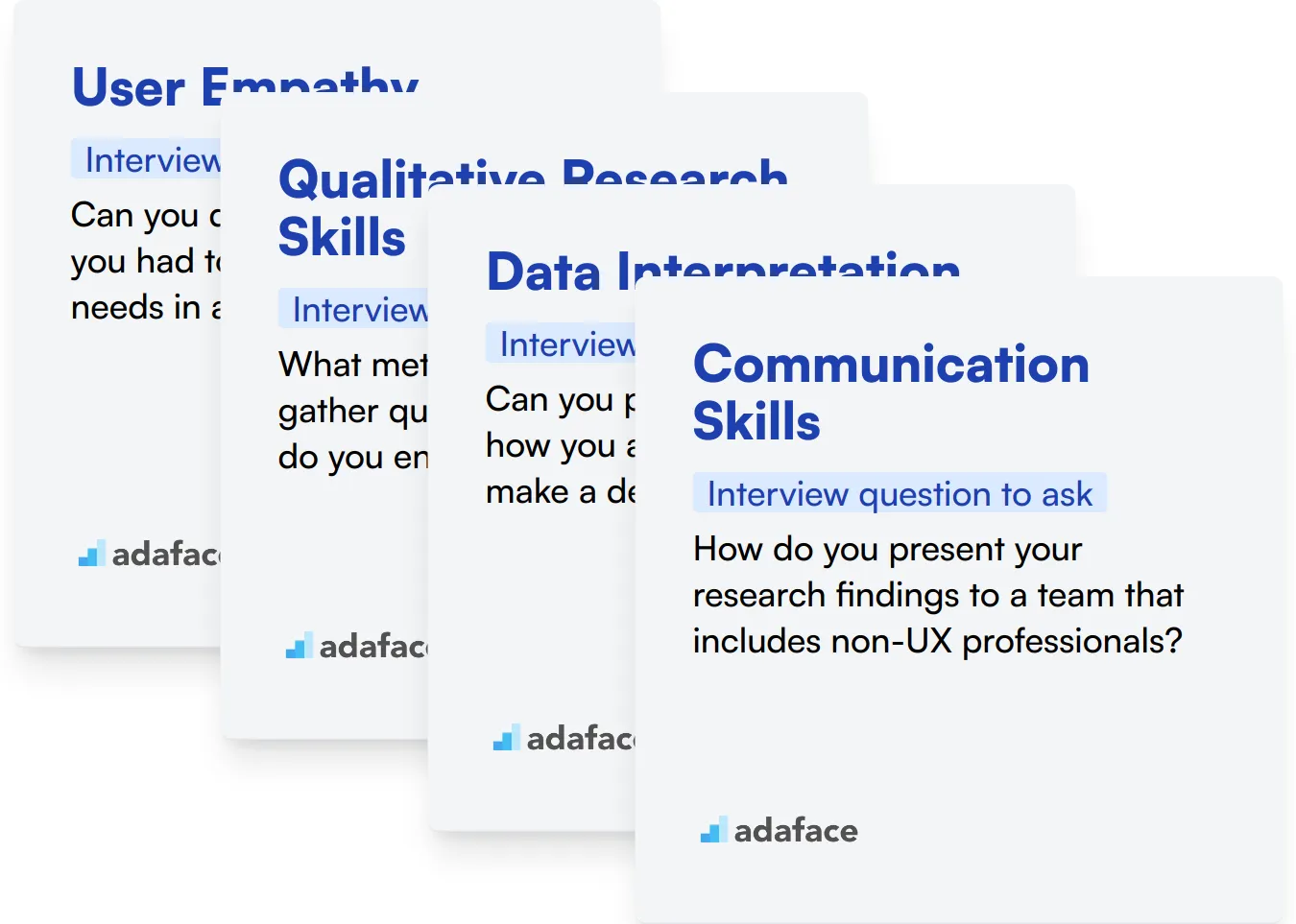
User Empathy
User empathy is the cornerstone of UX Research. It enables researchers to understand and relate to the user's pain points, leading to the creation of more user-centric designs.
Consider using an assessment test that evaluates user empathy through situational judgments. This helps screen candidates before the interview stage, ensuring they possess this skill.
In the interview, you can further assess user empathy by asking targeted questions.
Can you describe a time when you had to advocate for the user’s needs in a project?
Look for answers that show the candidate has genuinely taken user feedback into account and advocated for changes based on user needs.
Qualitative Research Skills
Qualitative research skills are crucial for UX Researchers to gather in-depth insights through interviews, focus groups, and usability tests.
To evaluate this skill during interviews, ask specific questions about their experience with qualitative research.
What methods do you use to gather qualitative data, and how do you ensure its accuracy?
Look for detailed responses that indicate familiarity with various qualitative methods and an understanding of how to ensure data reliability.
Data Interpretation
Data interpretation skills are pivotal for converting raw data into actionable insights, which can significantly improve user experience.
You can use a data interpretation test as a preliminary filter for candidates, ensuring they have the basic skills needed for the role.
During the interview, you can ask candidates to explain how they interpreted data in past projects.
Can you provide an example of how you analyzed user data to make a design decision?
Ideal answers should demonstrate the candidate’s ability to translate data into specific action points or design improvements.
Communication Skills
Effective communication skills are vital for UX Researchers to present their findings clearly to stakeholders and collaborate with cross-functional teams.
An assessment test on communication skills can help gauge the candidate's ability to convey complex information simply.
Assess communication skills by asking questions that require detailed explanations or presentations.
How do you present your research findings to a team that includes non-UX professionals?
Look for clear, concise answers that show the candidate’s ability to make their findings understandable and actionable for all team members.
Strategic Tips for Leveraging UX Research Interview Questions
Before you start applying the insights from this guide, here are a few strategic tips to ensure you're effectively using UX research interview questions to their full potential.
1. Incorporate Skill Assessments Prior to Interviews
Utilizing skill assessments before the interview process can significantly streamline candidate evaluation. These assessments help in filtering candidates who possess the necessary technical skills, reducing the time spent during actual interviews on basic qualification checks.
For UX researchers, consider integrating tests like the UI/UX Design Test to assess their design thinking and user empathy skills before they meet the interviewer. This pre-screening step can give a clearer picture of the candidate’s capabilities and fit.
This approach not only enhances the efficiency of the hiring process but also ensures that only the most competent candidates advance to the interview stage, where you can focus more on assessing cultural fit and problem-solving abilities.
2. Curate Your Interview Questions Carefully
With limited time in interviews, choosing the right questions is key to evaluating the candidate's core competencies effectively. Focus on crafting a set that examines crucial aspects of UX research.
Explore integrating questions from related areas to gain a fuller view of the candidate’s skills. For instance, questions on Communication can reveal how effectively they can convey complex information, a necessity for UX researchers.
By selecting a targeted mix of questions, you are more likely to uncover the candidate's capabilities in relation to the specific demands of the UX researcher role.
3. Emphasize Follow-Up Questions
Relying solely on prepared questions may not always reveal the full depth of a candidate’s expertise or creativity. Follow-up questions play a crucial role in this deeper exploration.
For example, if a candidate describes a past project where they improved user experience, follow up by asking how they measured success in that project. This can reveal their analytical skills and understanding of metrics, which are important for the role.
Use UX Research interview questions and skills tests to hire talented researchers
If you are looking to hire someone with strong UX Research skills, you need to ensure they possess the necessary expertise. The best way to do this is by using skills tests. Consider using our UI/UX Design Test to assess the candidate's technical skills accurately.
Once you use this test, you can shortlist the best applicants and call them for interviews. For the next steps, you can sign up on our dashboard or visit our online assessment platform to get started.
UI/UX Design Test
Download UX Research interview questions template in multiple formats
UX Research Interview Questions FAQs
Key skills include strong analytical abilities, empathy for users, proficiency in research methodologies, and excellent communication skills.
Ask about specific projects they’ve worked on, the methodologies they used, and how they interpreted and applied their findings.
Focus on basic concepts such as understanding user personas, conducting surveys, and their approach to analyzing data.
Present them with a hypothetical problem and ask them to detail their step-by-step approach to solving it.
Basic questions assess foundational knowledge, intermediate questions evaluate applied skills, and advanced questions test strategic thinking and experience.
Understanding user personas is critical for UX researchers as it helps them to design and implement more effective user-centered research strategies.

40 min skill tests.
No trick questions.
Accurate shortlisting.
We make it easy for you to find the best candidates in your pipeline with a 40 min skills test.
Try for freeRelated posts
Free resources




